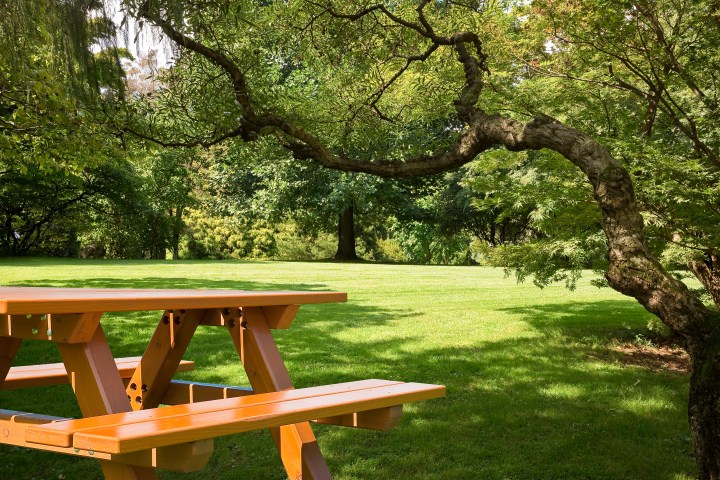
The value of parks is rising. Luckily, in many cases, costs are declining.
The value of parks is rising. Luckily, in many cases, costs are declining.

Green space is more than a place to walk your dog. Research shows that access to green space and parks benefits mental and physical health. During the pandemic quarantines, park attendance rose, with Americans seeing them as safe spaces for recreation and relaxation.
Now, cities across the country are trying to accommodate increased demand for public parks and outdoor spaces. But with smaller budgets to work with, in many cases, and higher construction costs, developers have to find creative ways to provide these tranquil destinations.
In an article for Bloomberg CityLab, Patrick Sisson writes, “As the understanding of just how much value parks add to the urban landscape expands, city officials will need to be more nimble and creative to continue to realize these benefits as budgets become tighter.”
Sisson spoke with “Marketplace” host Kai Ryssdal about how developers are building parks on low budgets and expanding residents’ access to green spaces.
The following is an edited transcript of their conversation.
Kai Ryssdal: Tell me about this park in Hayward, California, that you start this piece with and what makes it so special costwise?
Patrick Sisson: Well, yeah, basically parks of this nature — it’s a linear park. It runs alongside a very busy road, Mission Boulevard in Hayward. And typically parks of this size run about $50 or $60 a square foot for design and development. The company that did this, Surfacedesign, managed to do it for $7.50. And the reason they save so much money is because they reused materials. They actually scavenge stuff from construction sites, old fallen trees — reuse those as benches — and figured out how to significantly reduce the cost of this park. The landscape architect for the city was really doubtful they’d be able to do it because you just saw the budget shortfall, and they managed to make it work.
Ryssdal: They had to get creative, shall we say, because of those budget shortfalls, right? And this isn’t just Hayward. It’s cities and municipalities all across the country.
Sisson: Yes, parks are facing a lot of the same economic challenges that every sector of the economy has faced over the last three years. Costs have been rising significantly, everything from steel to playground equipment to installing bathrooms and doing landscaping. Not to mention labor costs have really shot up, which is making it really hard to maintain and build new parks.
Ryssdal: What does this park look like? I mean, if you drove by on Mission Boulevard in Hayward, and you looked to your right or your left, I suppose, what would it look like?
Sisson: Yeah, you’d see a long, winding path, with gravel on either side, a lot of old redwood trees that had been cut down and turned into seeding. You know, it was a park before, but it just, you know, didn’t get sorta that tender loving care. It was really used a lot for dog walking. Now it’s really come alive. And it’s become much more of like a community gathering place and sort of a resource.
Ryssdal: Yeah, well, we should, we should say, you know, parks aren’t just for dogs, right? I mean, it goes to mental health. It goes to also, oh, by the way, climate change and urban heat islands and all of that.
Sisson: Yeah, I mean, as a lot of us discovered, especially during the pandemic, you know, parks are really a resource for so many things. And you know, more and more research comes in every day about the benefits of parks in terms of mental health, as you mentioned, cooling effects, resiliency in terms of absorbing water, and climate change. So, you know, the need and demand for parks has really exploded over the last couple years.
Ryssdal: I wonder how big a challenge it was for the folks in Hayward, but also elsewhere in the country as they try to do, you know, nice parks for less, managing people’s expectations, right? Because you could see somebody saying, “Wait, I want a really nice thing, not a cheap thing.”
Sisson: Yeah, right. I mean, this is really important. The idea is not quick, fast, and easy because you want something that really lasts, right? You know, what really should be the goal here, especially when you talk with a lot of advocates, is creating parks and expanding networks so everyone has access. The Trust for Public Land has this 10-minute park campaign. And the idea is to create a park within a 10-minute walk of where everyone lives. Right now, 1 in 3 Americans doesn’t have that.
Ryssdal: Yeah, that seems kind of extraordinary, actually. One in 3 Americans doesn’t have a park within 10 minutes.
Sisson: Yeah, right. Parks or green space. And I mean, you know, there’s a lot of ways, though, that you can do this without having to necessarily expend a ton of capital because, you know, creating a new park requires land and that can be very expensive. You know, you’ve seen a lot of programs in cities, New York City, for example, but many others, where they’re opening up city playgrounds. This has been in existence for a while, and it’s really caught on and really helped increase that access.
There’s a lot happening in the world. Through it all, Marketplace is here for you.
You rely on Marketplace to break down the world’s events and tell you how it affects you in a fact-based, approachable way. We rely on your financial support to keep making that possible.
Your donation today powers the independent journalism that you rely on. For just $5/month, you can help sustain Marketplace so we can keep reporting on the things that matter to you.

















